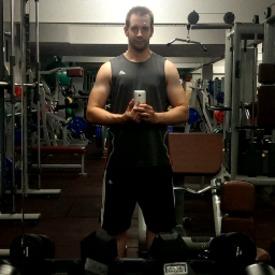Am I doing this right?

Fisah17
Posts: 202 Member
I have 10 lbs to lose before I hit maintenance/tone up focused mode. I am taking in right under 1500 calories daily, which is the goal but then my workouts average 400 calories which puts me at not eating enough? Yes, that is my first question am I supposed to makeup those calories to be safe/healthy or not necessary? I have about 6 weeks to go at this pace before I can hit maintenance mode and start increasing calories and Maintaining my workout schedule. Once I reach my goal weight and don't need to drop 3,500 calories a week, do you just add back 500 calories a day for maintenance mode, which puts me at 2,000 and then it would decrease based on calories burned working out. My brain is overwhelmed lol, it may be this late night workout I just finished but I need someone to break this down for me. Thanks in advance!!
0
Replies
-
As for what to do right now, this will come down to two things in my opinion.
1. Are you comfortable with your level of intake (no excessive cravings, lethargy etc.)?
2. Are you resistance training? This will make sure the weight you lose is more fat and less muscle - it becomes more important as your caloric deficit increases.
If the answer to these questions are both yes, then continue as you are until you hit the maintenance weight/body fat that you are happy with. If you can get it done more quickly and safely with your current regimen, then that's fine.
As for what to do after this, I would advocate a slow build back up to maintenance calories. Add an extra 100 cals a day for a week, then another hundred the following week, etc. Do this until your weight starts to even out again (remembering that more calories will result in a slightly higher scale weight (particularly if there are more carbs in your diet).2 -
As for what to do right now, this will come down to two things in my opinion.
1. Are you comfortable with your level of intake (no excessive cravings, lethargy etc.)?
2. Are you resistance training? This will make sure the weight you lose is more fat and less muscle - it becomes more important as your caloric deficit increases.
If the answer to these questions are both yes, then continue as you are until you hit the maintenance weight/body fat that you are happy with. If you can get it done more quickly and safely with your current regimen, then that's fine.
As for what to do after this, I would advocate a slow build back up to maintenance calories. Add an extra 100 cals a day for a week, then another hundred the following week, etc. Do this until your weight starts to even out again (remembering that more calories will result in a slightly higher scale weight (particularly if there are more carbs in your diet).
I'm not having any excessive cravings anymore since its been about 4 months and going strong doing intermittent fasting daily from 8p - 8a. That said I am more tired and seem to burnout faster, but I have mentally chalked that up as a short term sacrifice if I'm not causing long term damage and it doesn't sound like it. I am doing resistance training and will start on Thursday with a trainer that knows my long term goal is to build muscle definition.
Thanks for explaining the plan for increasing calories later and what to expect with my weight.0 -
No worries, if you are feeling a bit drained, there are a couple of things you could try.
You could calorie cycle, which will give you a larger deficit on non-training days, and a little more to eat on active days. Or you could incorporate a couple of re-feeds, just to keep hormone and energy levels a higher after long-term dieting.
There are a heap of good resources out there on how to implement these if you feel you need them.
Good luck for the last push! 2
2 -
Yes, eat your exercise cals1
-
When you increase your calorie allowance go slow. Don't all off a sudden increase with 500 calories. Take it with a pace of about 100 cal increase on your daily allowance each week. This gives the body time to adapt to getting extra calories again.2
-
Yes you need to account for your significant energy expenditure.
You can either follow the MyFitnessPal method of logging exercise after the event for a variable daily allowance or the TDEE method where it's averaged out over the week and you eat the same level daily. Over the course of time they should both end up in roughly the same place.
And this is one of the big reasons why you need to consider your exercise burns.....
"That said I am more tired and seem to burnout faster."
Which means your workout performance and recovery are being compromised, working hard but not getting the best results from your hard work.
Use your long term weight trends to judge your actual energy balance as both your intake (food) and output (exercise) are just estimates.2 -
No worries, if you are feeling a bit drained, there are a couple of things you could try.
You could calorie cycle, which will give you a larger deficit on non-training days, and a little more to eat on active days. Or you could incorporate a couple of re-feeds, just to keep hormone and energy levels a higher after long-term dieting.
There are a heap of good resources out there on how to implement these if you feel you need them.
Good luck for the last push!
Thanks for all the info and encouragement!0 -
Yes you need to account for your significant energy expenditure.
You can either follow the MyFitnessPal method of logging exercise after the event for a variable daily allowance or the TDEE method where it's averaged out over the week and you eat the same level daily. Over the course of time they should both end up in roughly the same place.
And this is one of the big reasons why you need to consider your exercise burns.....
"That said I am more tired and seem to burnout faster."
Which means your workout performance and recovery are being compromised, working hard but not getting the best results from your hard work.
Use your long term weight trends to judge your actual energy balance as both your intake (food) and output (exercise) are just estimates.
Thanks for the info and I will definitely consider the MFP method to recover some of the calories/energy throughout the day at a varied rate.0 -
No worries, if you are feeling a bit drained, there are a couple of things you could try.
You could calorie cycle, which will give you a larger deficit on non-training days, and a little more to eat on active days. Or you could incorporate a couple of re-feeds, just to keep hormone and energy levels a higher after long-term dieting.
There are a heap of good resources out there on how to implement these if you feel you need them.
Good luck for the last push!
Thanks for all the info and encouragement!
Did the Calorie cycling today and ate the burned calories but still within my 1500 daily goal--major change in energy level and my mood. Which I'm sure was appreciated by all around me!!2 -
Also, it seems like trying to lose a pound a week when you only have 10 pounds left to lose seems excessive. Why not slowly/gradually get used to "maintenance" (which really is a whole 'nother way of thinking and behaving) by trying to lose a half-pound/week. Build up your resistance training, and do it in a way that minimizes muscle loss and maximizes fat loss for these last 10 pounds. A pound a week while almost at your goal is almost a sure-fire way to ensure that most of that weight lost will be more muscle than fat.0
This discussion has been closed.
Categories
- All Categories
- 1.4M Health, Wellness and Goals
- 398.2K Introduce Yourself
- 44.7K Getting Started
- 261K Health and Weight Loss
- 176.4K Food and Nutrition
- 47.7K Recipes
- 233K Fitness and Exercise
- 462 Sleep, Mindfulness and Overall Wellness
- 6.5K Goal: Maintaining Weight
- 8.7K Goal: Gaining Weight and Body Building
- 153.5K Motivation and Support
- 8.4K Challenges
- 1.4K Debate Club
- 96.5K Chit-Chat
- 2.6K Fun and Games
- 4.8K MyFitnessPal Information
- 12 News and Announcements
- 21 MyFitnessPal Academy
- 1.5K Feature Suggestions and Ideas
- 3.2K MyFitnessPal Tech Support Questions



